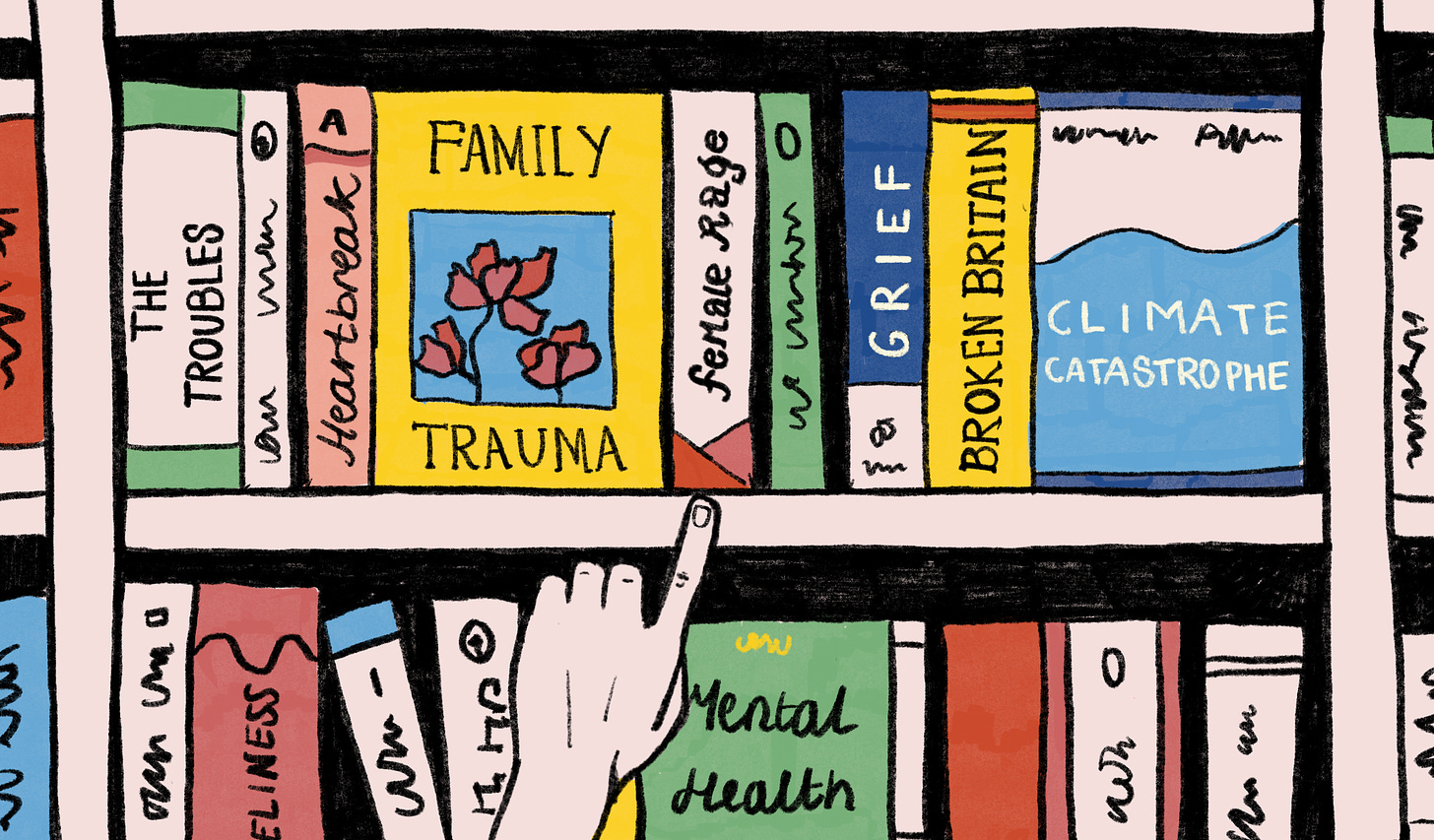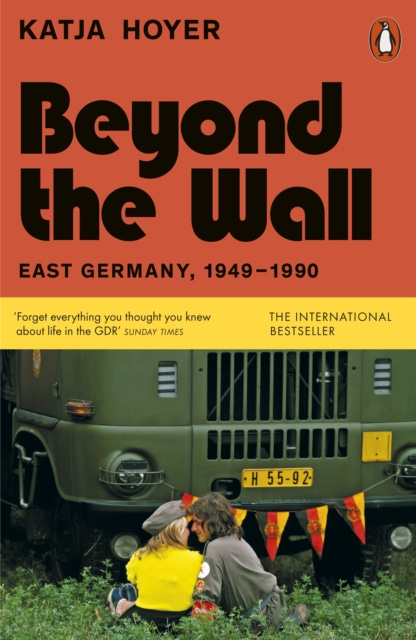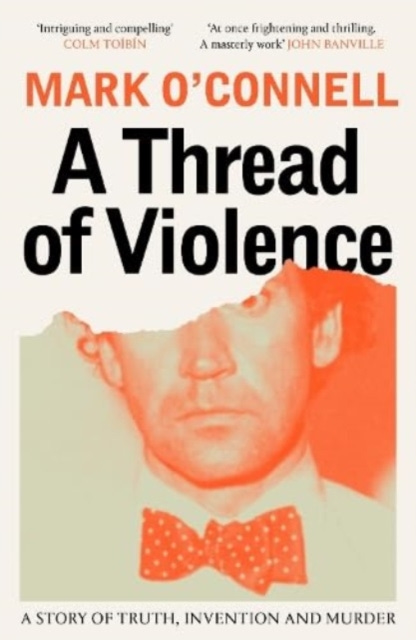SOME CUSTOMERS ARE more memorable than others. I think it will be a long time before I forget the woman who came to the counter requesting “the most depressing books you can think of”. She’d recently devoured A Little Life, she explained, and, if anything, she wanted something a little darker. (Yes, she was dressed head to toe in black.) Sadly, Liz Truss’s book had yet to be published, but we found something else suitably bleak.
A much more common request, though, is the opposite. “I’d like something uplifting,” a browser might say, or “can you recommend some really happy books?” Other versions of the same request specify something light or funny — certainly nothing with heavy or dark themes.
At this point as a bookseller you start scratching your head, mentally sorting through the last dozen or so books you read for something that halfway jolly. The one about the serial killer? Best not. That one with the big fire? Out. The reportage about a medical scandal? Definitely out. The lovely story about friendship — promising — that touches heavily on abortion? Bugger.
It’s a good thing books don’t have trigger warnings because otherwise they’d all have them. You could lay out a whole bookshop in the manner tobacconists are now required to sell cigarettes: in place of alluring covers, each book would sport a slightly different warning of impending discomfort.
Here we face what you could call the happiness problem. The trouble with happiness is that it’s far too nice to be interesting. Ordinary happiness, that is. Ecstasy? Sure, that’s intriguing. Sudden and momentary elation is great for a page or two. But plain old happiness? After a while, reading about that leaves the reader, ironically enough, feeling rather flat.
Writers, naturally, run a mile. What propels a narrative, they will say, are stakes: What does a character stand to gain or lose at any given moment? If the answer is “not very much”, it is hard to insist that the reader care. Writers crave complications so that they can eventually dish out resolutions. Or, as we might put it, a beginning (the status quo), a middle (the problem) and an end (the solution).
All of which raises the question: do readers actually want happy books or only think they do? A cynic could argue that they might say they want something uplifting, but their revealed preference (as economists call the choices people take, rather than the opinions they declare) is for grisly but gripping fare. Lee Child didn’t become a bestseller writing about beekeeping.
That’s not the whole story, though. It may well be that the most compelling — and therefore the most popular — narratives rely on a generous helping of grit. But there is still much to be said for a book that deliberately eschews such drama.
A happy book will come in handy for certain occasions: I often hear this request from a customer looking for a gift for a friend or relative with a long hospital stay, for instance. But every reader might cherish such a book from time to time, precisely because it is so rare, as a respite from a world so abundantly full of stakes.
This is probably one reason why a certain kind of diary is so popular. I remember my grandma devouring those of Gervase Phinn, a teacher and school inspector in Yorkshire. A similar impulse draws readers to Shaun Bythell’s The Diary of a Bookseller and its sequels.
There are everyday ups and downs in such works, of course, but they are, ultimately, “safe spaces”: the biggest drama is going to be the hunt for a missing book. The relentless chronology of a diary stands in for a narrative thrust; readers can instead get their kicks from character sketches, slices of life and soothing repetitions (Bythell, for instance, tots up the takings in each day’s entry).
For a low-stakes novel to succeed requires a writer of exceptional ability, which is probably why so few risk it. I often fall back on PG Wodehouse (there are stakes here, of course, but they are so ludicrous and comic — the theft of prize pigs and the goings on at absurd gentlemen’s clubs — that they are not at all the point).
I am off to Paris next week, armed with a bunch of (no doubt propulsive and no doubt unhappy) proofs. But as a little treat — a ray of literary sunshine — I’m also taking Fine Weather, Jeeves, a collection of Wodehouse’s summery writing. It’s hard to be gloomy for long reading about characters with names like Bingo Little.
So, a challenge for you: what other books would you prescribe for a reader looking for a work of unqualified happiness? What do you turn to when you need some bookish sunshine?
Pop it in the comments below or hit “reply”. I’ll round up the best in a future newsletter.
**
We’re hiring
Read along with me
They’re like a regular book club, except the author themselves joins us on Zoom after the first bit of discussion to answer our questions about the book. What did he or she really intend by that passage? Why didn’t he get the girl?
Both clubs attract a really high calibre of author. At the non-fiction group, we’ve been lucky enough to host the likes of Patrick Radden Keefe, Katherine Rundell, Tim “Prisoners of Geography” Marshall and Christina Lamb. We’ve had Nobel and Pulitzer prize winners, too.
Our next non-fiction session is on Beyond the Wall, a highly acclaimed account of everyday lives in East Germany. Its author, Katja Hoyer, will be joining us on Zoom on 27th August at 8pm.
Come along and give it a go? You can join from anywhere in the world; we’ll post you the book now so you have time to read it first.
As an added incentive, we’ll give you an extra 10% off a one-off session to either book club if you order between now and the end of August. Just use the code GOONTHEN at checkout.
Upcoming events
-
9 August, 6.30pm Poetry open mic night Free. No need to pre-book.
-
11 September, 7.30pm Tim Shipman, Out SOLD OUT
-
18 September, 7.30pm David Hepworth, Hope I Get Old Before I Die: Why Rock Stars Never Retire
-
6 November, 7.30pm Andrew O’Hagan, Caledonian Road
The Backstory chart
Hardback
-
Evenings and Weekends by Oisin McKenna I devoured our book of the month, set over the course of one sweltering weekend in London, as the deeds and desires of several interconnected characters collide.
-
Blue Sisters by Coco Mellors The author of Cleopatra and Frankenstein returns with the tale of three siblings coping with their sister’s death.
-
The Trading Game by Gary Stevenson A riveting memoir of a guy from a humble background who makes it big in the City before asking himself — and his former bosses — searching questions about inequality and the nature of our modern economy.
-
The Safekeep by Yael van der Wouden In the Dutch countryside in the 1960s, a reclusive young woman must reckon with a houseguest — and her family’s hidden past. A brilliant debut novel.
-
Sandwich by Catherine Newman From the author of We All Want Impossible Things, a story about the secrets that intrude on a family holiday.
Paperback
-
Damascus Station by David McCloskey Sun, sex, spies — and Syria. I tore through this debut thriller from a former CIA operative.
-
Tom Lake by Ann Patchett This is a gorgeous read, about two grown-up daughters who finally have the time to ask their mother about her first love.
-
Kala by Colin Walsh One of my favourite books of last year, new in paperback. A dark, twisty tale of friendship and suspicion set on the Irish coast, perfect for the beach.
-
Butter by Asako Yuzuki Everyone’s reading it.
-
Murder on Lake Garda by Tom Hindle Who needs Italy? Read this murder mystery this week next to your nearest pond.
Kids
-
The Majorly Awkward BFF Dramas of Lottie Brooks by Katie Kirby
-
Bunny vs Monkey: The Impossible Pig by Jamie Smart
-
Wowzers! by Lou Carter and Magda Brol
-
Kay’s Incredible Inventions by Adam Kay
-
Octopus Shocktopus! by Peter Bently and Steven Lenton
True crime you’re not embarrassed to read on the tube
The session was great, and I would heartily recommend the book, especially if you’re usually a little reluctant to dip into non-fiction. At its heart is the fascinating tale of Malcolm Macarthur, an eccentric Irish aristocrat who hatches a plan in the 1980s to solve his money worries by robbing a bank. He succeeds only in murdering two people in his attempt to acquire a gun and a getaway car. After an extensive manhunt, he is found by the police in the most improbable place — staying as a houseguest of his friend, Ireland’s then Attorney General.
This is no spoiler: O’Connell sketches out the basic facts of the case in the first few pages. Instead, the book centres on a series of conversations O’Connell has with Macarthur (now released after a lengthy jail spell) and on O’Connell’s reflections on our obsession with true crime and the ethical issues involved. It’s a great, short read.
A(nother) magazine I love
It publishes fiction, features, funnies and investigations from some of the most exciting new writers in Britain (and some older ones too, like John Banville). You might enjoy their piece in which they summate the entire literary canon – with one line for each author.
The Fence has won endorsements from Marina Hyde and Richard Osman, with legendary satirist Craig Brown calling it “the most original new magazine for years”. Marina O’Loughlin reckons it’s “the best publication to hit newsstands in aeons”.
Right now, you can subscribe with a 20 percent discount using the code ‘5YOFENCE’ on print, digital – or both. Use it at the checkout at this link here.
Tom





